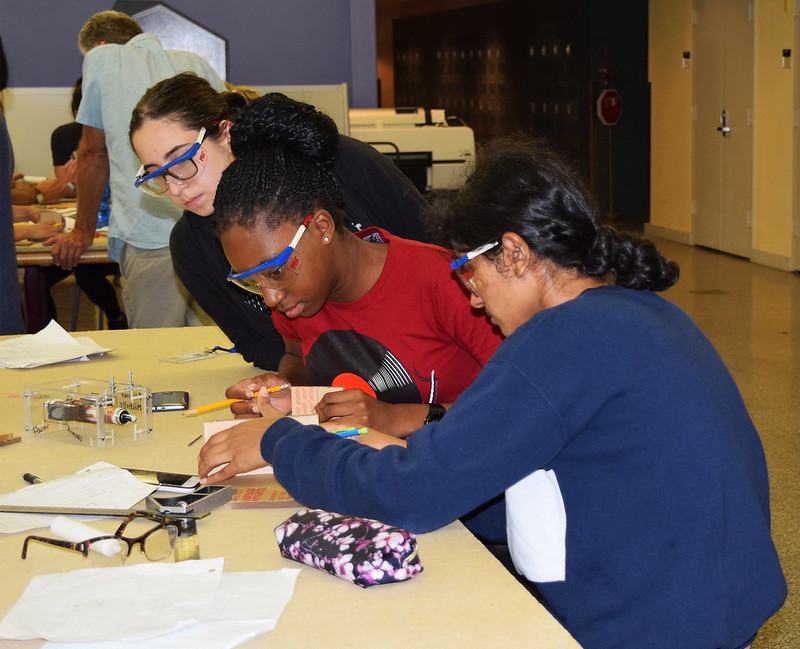Diversity, Equity, and Inclusion

Developing leaders who will offer the world new technological possibilities grounded in human values starts with a learning and research community that supports all of its members, regardless of race, gender, or identity.
The MIT Schwarzman College of Computing and the units within are engaging in activities aimed at improving the climate for underrepresented groups. These actions, which align with those of the larger MIT community, are important early steps to becoming a more equitable and welcoming place to thrive.
Outreach
The Department of Electrical Engineering and Computer Science (EECS) has spearheaded several initiatives to increase women’s participation in academia and STEM fields, including Rising Stars in EECS and the Women’s Technology Program.
EECS is also involved in a range of efforts to broaden participation in computing, such as the graduate student-led mentorship initiative, the Graduate Application Assistance Program, and through hands-on learning opportunities via 6.811 (Principles and Practice of Assistive Technology) and the AT Hackathon, to help students better understand the needs of those who use assistive technology.
The department’s first equity officers, Frédo Durand Leslie Kolodziejski, co-chair the EECS Committee for Diversity, Equity, and Inclusion. The charge of the committee is to accelerate progress, identify opportunities, and create action plans to affect change in departmental policies, procedures and activities, and make improvements to physical spaces.

Faculty and students within both EECS and the Center for Computational Science and Engineering are engaged with the MIT Summer Research Program and the University Center for Exemplary Mentoring. These programs are dedicated to increasing diversity and supporting the academic success of minority graduate and doctoral students at MIT.
The Computer Science and Artificial Intelligence Laboratory (CSAIL) has worked on several diversity initiatives, including but not limited to, hosting and mentoring MLK Scholars; presenting Great Women in Technology, the inaugural TEDxMIT event featuring an all-female lineup of 13 scientists and engineers. CSAIL is also planning a number of new activities that aim to improve diversity, equity, and inclusion and enhance culture at the lab in coordination with CSAIL’s Postdoc and Graduate Student Council, Cabinet, and PIs.
The MIT-IBM Watson AI Lab and EECS are working with IBM to develop mentorship activities for underrepresented minority graduate students in EECS.
The MIT Quest for Intelligence brings together diverse teams to work at the intersection of science and engineering with the aim for breakthroughs in both natural and artificial intelligence. Since its inception in 2018, 41% of Quest research projects were awarded to women researchers
Equity and inclusion leadership
The college will look to appoint an MIT faculty member as associate dean in the 2020-21 academic year and has concluded its search for an assistant dean for equity and inclusion. With direction and guidance from these individuals and the entire leadership group, the college will work to improve and create programs and activities that broaden participation in computing classes and degree programs, increase the diversity of top faculty candidates in computing fields, and ensure that faculty search and graduate admissions processes have diverse slates of candidates and interviews.
Resources
For more information on MIT’s diversity, equity, and inclusion resources, see the Institute Community and Equity Office, Institute Discrimination and Harassment Response Office and Human Resources websites.
Statement on anti-racism and the advancement of diversity, equity and inclusion
June 24, 2020 — The leadership of MIT’s Schwarzman College of Computing stands in solidarity with Black people and those committed to anti-racism. We abhor and reject the entrenched racism and brutality that continues to rob so many families of loved ones, and foreshortens the horizons and opportunities for so many more. Tackling systemic racism and its accumulated legacy requires channeling energy, ideas, effort, and action from every field of study across our campus, and beyond. We have been building links and fostering partnerships, so that together we can work to advance the role of computing in progress toward a more equitable society. With ICEO John Dozier, we are working to fulfill the college’s commitment to hire a leader for equity and inclusion. We have also organized several community events in college units (including EECS, CSAIL, and IDSS) to discuss how to best combat racism and its adverse consequences on our community and society, and are committed to being an active part of Institute-wide action to address racism and advance diversity, equity, and inclusion.
The college is actively working to address racism and to advance diversity, equity and inclusion, in partnership and collaboratively with the academic units, labs and centers of the college. We support some long-standing programs and activities in these units, as well as others that are in response to the current moment. These involve students, faculty and staff in the individual units of the college in listening, learning, and action. Since the inception of the college in January, we have focused on improving diversity in faculty recruiting, and are developing additional plans for graduate admissions, and for improving the culture and climate in the college, in conjunction with the rest of MIT. We expect to share more about these activities over the summer and through the fall semester.
Alana Anderson, Assistant Dean for Diversity, Equity, and Inclusion
Caspar Hare, Associate Dean for SERC
Daniel Huttenlocher, Dean
Eileen Ng, Assistant Dean for Administration
Asu Ozdaglar, Deputy Dean for Academics and EECS Department Head
Georgia Perakis, Associate Dean for SERC
Daniela Rus, Deputy Dean for Research and CSAIL Director